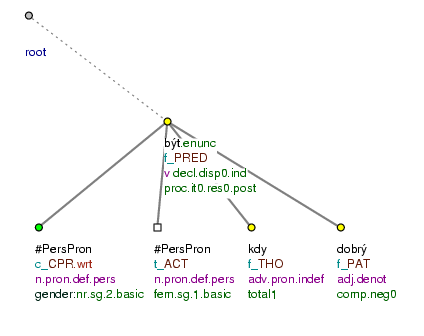- Definition of the
CPRfunctor -
CPR(comparison) is a functor used for adjuncts expressing manner by means of comparison. Modifications with theCPRfunctor refer to an entity or event to which the entity or event expressed by the governing word is compared to.
Subfunctors. The CPR functor is further specified by subfunctors. See Section 13.1.3, "Subfunctors with the CPR functor".
CPR modifications have primarily the form of a dependent clause; however, not only events but also entities can be compared - the CPR modification then depends on a noun.
Constructions with the meaning of comparison are discussed in detail in Section 4, "Constructions with the meaning of "comparison"".
Forms. The basic forms of modifications with the CPR functor are:
-
dependent clause.
The most common forms:
než Musíme udělat nepochybně menší a snazší manévr, než byl ten minulý. (=We have to do a smaller and easier manoeuvre than was the last one) nežli Na Afriku zbývají jen asi 3 miliardy dolarů ročně, což je méně, nežli obdržela loni Malajsie. (=...which is less than Malaysia got last year) jako Podmínky pro vznik heroinové epidemie jsou až nebezpečně příznivé, podobně jako tomu bylo v Americe beatnické éry. (=The conditions are good, just like they were in America in the beatnik era) For a discussion on cases in which the modifications introduced by než, nežli and jako are not analyzed as dependent verbal clauses, see Section 4, "Constructions with the meaning of "comparison"".
-
prepositional phrase.
The most common forms:
nad+4 nad slunce jasnější (=lit. over sun clearer; meaning: it is patently obvious that..) naproti+3 Naproti tomu Jirka přišel včas. (=On the contrary, Jirka was on time) na rozdíl od+2 Narozdíl od tebe už to má hotové. (=Unlike you, she is finished with it) oproti+3 Oproti tobě je starý. (=He is old compared to you) proti+3 V prvním čtvrtletí 1994 vzrostl HDP proti stejnému období předchozího roku 1993 o 3.5 procenta. (=...the GDP increased by 3.5 per cent, compared to the same period last year) s+7 S léty přibývají zkušenosti (=With years, experience grows) v porovnání s+7 V porovnání s tebou budu vždycky lepší. (=When compared to you, I'll always be better) v porovnání k+3 Obchodní vztahy mezi Českou republikou a Kanadou patřily v minulosti v porovnání k ostatním průmyslově vyspělým zemím k okrajovým. (=The business contacts...were marginal, in comparison to other developed countries) ve srovnání s+7 Akcie českých podniků jsou ve srovnání se zahraničím stále vysoce nadhodnoceny. (=...overvalued, in comparison to the situation abroad) Example:
Ve srovnání s tebou.
CPRbudu vždycky lepší. (=Compared to you, I'll always be better) Fig. 7.32 -
adverbial expressions (only marginally).
Example:
Počínal si hazardérsky.
CPR(=lit. (He) acted REFL hazardously; i.e. like a daredevil)
Figure 7.32. The CPR functor

V porovnání s tebou budu vždycky lepší. (=lit. In comparison with you, (I) will_be always better)
Border with the MANN functor. The CPR functor is very close to the most general functor for expressing manner: the MANN functor (see Section 6.6, "MANN"). See Section 6.6.1, "Borderline cases with the MANN functor".
Border with the RESTR functor. Comparative constructions (the CPR functor), especially in constructions with the connective než, can get very close to constructions with the meaning of a restriction (the RESTR functor; see Section 6.10, "RESTR"). See Section 6.1.2, "Constructions signifying "restriction" attached by connectives".
Functors bordering as the result of the multifunctional conjunction "jako". The CPR functor can get very close to the COMPL functor (see Section 11, "Functor for the predicative complement (COMPL)") and even to the paratactic connection functors: CONJ (see Section 12.1.2, "CONFR") and APPS (see Section 12.2, "Functor for apposition (APPS)"). This is caused by the fact that the conjunction jako carries the meaning of all the mentioned functors; it is both a coordinating and subordinating connective. See Section 17.4, "The conjunctions "než" and "jako"".